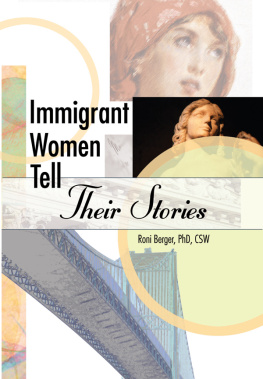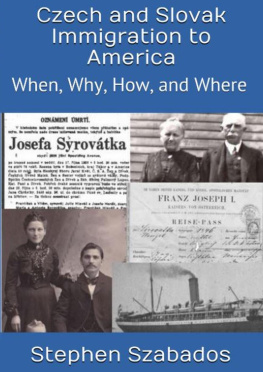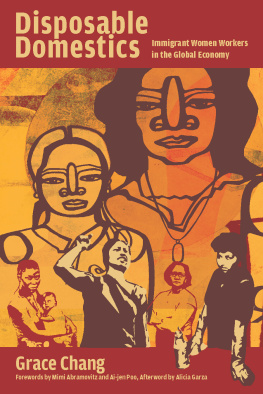First published by
The Haworth Press, Inc.
10 Alice Street
Binghamton, N Y 13904-1580
This edition published 2011 by Routledge
Routledge
Taylor & Francis Group
711 Third Avenue
New York, NY 10017
Routledge
Taylor & Francis Group
2 Park Square, Milton Park
Abingdon, Oxon OX14 4RN
2004 by The Haworth Press, Inc. All rights reserved. No part of this work may be reproduced or utilized in any form or by any means, electronic or mechanical, including photocopying, microfilm, and recording, or by any information storage and retrieval system, without permission in writing from the publisher.
PUBLISHERS NOTE
Identities and circumstances of individuals discussed in this book have been changed to protect confidentiality.
Cover design by Lora Wiggins.
Library of Congress Cataloging-in-Publication Data
Berger, Roni.
Immigrant women tell their stories / Roni Berger.
p. cm.
Includes bibliographical references and index.
ISBN 0-7890-1829-2 (hard : alk. paper)ISBN 0-7890-1830-6 (soft : alk. paper)
1. Women immigrants. 2. Emigration and immigration. 3. Emigration and immigrationPsychological aspects. I. Title.
HQ1154.B4148 2004
305.4'092dc21
2003009814
In loving memory of my mother Sarah Schwalb (Kutin), an immigrant woman
The New Colossus
Not like the brazen giant of Greek fame,
With conquering limbs astride from land to land;
Here at our sea-washed, sunset gates shall stand
A mighty woman with a torch, whose flame
Is the imprisoned lightning, and her name
Mother of Exiles. From her beacon-hand
Glows world-wide welcome; her mild eyes command
The air-bridged harbor that twin cities frame.
Keep ancient lands, your storied pomp! cries she
With silent lips. Give me your tired, your poor,
Your huddled masses yearning to breathe free,
The wretched refuse of your teeming shore.
Send these, the homeless, tempest-tost to me,
I lift my lamp beside the golden door!
Emma Lazarus (1849-1887)
Immigration by women has become a major reality for many women as well as a target of social policy. The news is filled with stories of sweatshop workers, home care attendants, mail order brides, foreign nannies, and traffic in sex and international prostitution. Women arrive in the United States or other countries to follow a spouse, better their personal economic situation, or to escape persecution.
For many reasons, and contrary to gender expectations and stereotypes, many women, especially from third world nations, migrate alone, frequently in response to the demand for low-wage female labor in the receiving country. Leaving home for employment in first world labor markets allows women immigrants from third world nations to send desperately needed money back home. But to accomplish this they must pay the price of long-term separation from their children, spouses, extended families, and communities. According to Rachel Parrenas, a feminist anthropologist, many immigrant women from the Third World become partial citizens in the receiving nation-state.1 Not only are they separated from their families and homelands, but they often lack protection on the job, endure abuse, and live in a state of constant insecurity, especially the fear of deportation2
Popularly regarded as a matter of choice, the dynamics of immigration are considerably more complex. The personal decision to leave often reflects economic and geopolitical forces in both the sending and receiving nations. In many instances the decision to emigrate reflects consequences of the structural adjustment policies required of third world nations in exchange for loans from the World Bank and the International Monetary Fund. The indebted nation typically must divert national income to service the debt, which in turn limits both economic opportunities and public sector programs for its residents. First world nations are also pressed to initiate similar austerity measures (i.e., privatization, deregulation, and reduced social spending) in order to qualify for membership in the European Union.
Immigrant Women Tell Their Stories puts a human face on the lives of eighteen women who emigrated to the United States, Israel, and Australia from first or third world countries. The women departed from many different places: Albania, Brazil, Cuba, Ethiopia, France, India, Iran, Lebanon, Pakistan, the Philippines, and Russia. Few immigrated alone; even so, the women typically did not leave their home voluntarily. Most immigrated in response to decisions made by others, typically spouses, parents, or political leaders. Four of the women arrived as children, three met marital obligations, five participated in the decision to leave, and four made their own decision. Their stories reveal that a mix of social, economic, and political forces dictated their moves: the wish to avoid the ravages war, the need to escape religious persecution, the obligation to follow a spouse or to accompany parents, and the desire to pursue education or a career.
Berger applies a gender lens to the experience of these women immigrants. Seeking to redress the gender neutrality of traditional immigration studies, Berger, herself an immigrant to the United States, complicates the story by bringing the specific experiences of women into view. A social worker, she focuses on the stresses related to womens personal and cultural adjustments, especially experiences of loss, displacement, identity challenges, and mental health. Leaving home also exposed women (and male family members) to new gender norms while undercutting traditional family structures, gender-based roles, and the patriarchal authority arrangements that characterized their prior cultures.
The eighteen very different women talk about the risks and traumas they faced living through war, torture, displacement, refugee camps, separation, loss, and adjustment in a new nation. The women in this book are not among the most disadvantaged women immigrants. Yet they nonetheless faced numerous economic constraints, cultural dissonance, language problems, social barriers, prejudice, discrimination, and personal pain. Although many of the women experienced exploitation, marginalization, powerlessness, and more than one relocation, Bergers main point is that the women possessed considerable resilience and eventually most of them acculturated successfully.
Rather than focus on any one of the three receiving nations, Berger highlights the female experience. She reaches for what the female immigrants shared as women, without erasing important national or cultural differences. Berger carefully details how the immigrant women she met negotiated strangeness as they sought to carry out their prescribed wife and mother roles as well as the demands of employment in their new country. We learn how the women dealt with jobs and employers, but also how they managed their family lives. They had to learn about new foods, figure out how to calculate weights, measures, and currency, deal with schools, the health care system, and public assistance bureaucracies, all the while parenting children, soothing frustrated family members, and trying to maintain some degree of cultural continuity with their homeland.
The women reported both losses and gains, but also displayed considerable resilience despite the hardships of immigration and heavy responsibilities. Although they experienced poverty, unemployment, discrimination, and bureaucratic harassment, the women Berger interviewed placed the greatest emphasis on emotional, cultural, social, and psychological losses. The immigrant experience challenged their sense of identity, forced them to deal with the unfamiliar, left them fearful of making mistakes, caused them to ask for help from the wider society, created additional child rearing worries, and contributed to downward occupational mobility. Some of the women also reported a duality. Others felt misplaced without a sense of belonging anywhere.







